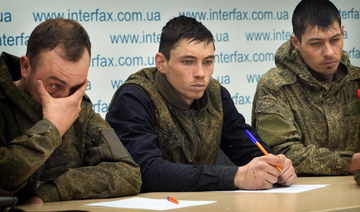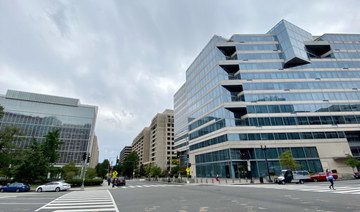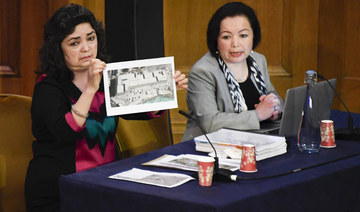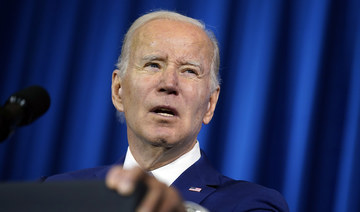KYIV/LVIV: Moscow on Monday offered escape routes to Ukrainians fleeing airstrikes and artillery bombardment — but only to Russia or its ally Belarus.
A spokesman for Ukrainian President Volodymyr Zelensky described the proposal as “completely immoral” and said Russia was trying to “use people’s suffering to create a television picture.”
“They are citizens of Ukraine, they should have the right to evacuate to the territory of Ukraine,” the spokesman said.
The Russian offer came before a third round of peace talks between Ukrainian and Russian negotiators. Earlier rounds produced little other than pledges to allow humanitarian access that have not been implemented.
Two days of failed ceasefires in the besieged southern port city of Mariupol have left hundreds of thousands trapped without food and water under relentless bombardment. In the town of Makariv in the Kyiv region, at least 13 civilians were killed in a Russian airstrike on a bread factory.
As Russian and Ukrainian delegations assembled for the ceasefire talks, a Ukrainian negotiator urged Russia to stop its assault on Ukraine, which the UN said had created 1.7 million refugees.
After Monday's third round of peace talks between Ukrainian and Russian negotiators, Russia’s U.N. Ambassador, Vassily Nebenzia, told the U.N. Security Council that Russia would carry out a cease-fire Tuesday morning and open humanitarian corridors leading away from Kyiv, Mariupol, Sumy and Chernigov. Zelenskyy expressed skepticism — saying that instead of an agreement on humanitarian corridors, what Ukraine got Monday was “Russian tanks, Russian Grad rockets, Russian mines.”
The two sides held a third round of talks Monday, with Russia’s top negotiator, Vladimir Medinsky, saying afterward that no progress was made toward a political settlement that would end the war. The countries’ foreign ministers are scheduled to meet Thursday in Turkey, according to that country’s top diplomat.
“In a few minutes, we will start talking to representatives of a country that seriously believes large-scale violence against civilians is an argument,” Ukrainian negotiator Mykhailo Podolyak said. “Prove that this is not the case.”
The general staff of Ukraine’s armed forces said Russian troops were “beginning to accumulate resources for the storming of Kyiv,” after days of slow progress in their advance south from Belarus. Ukraine said 2,000 civilians had been evacuated from Irpin, a Kyiv suburb that has been under heavy attack.
In Mariupol, deputy mayor Sergei Orlov said there had been continuous air raids on the city. Orlov said authorities were ready to evacuate 6,000 people but the Russians had bombed the buses that were to transport them.
Ukraine said its forces had retaken control of the town of Chuhuiv in the northeast, the scene of heavy fighting for days, and of the strategic Mykolayiv airport in the south, which the regional governor said was under tank fire.
Ed Arnold, an analyst with the Royal United Services Institute in the UK, said Russia would need to try to consolidate the gains it had already made and pause to mobilize more forces unless the pace of the assault picked up.
“At the current rate of Russian losses ... we do have indications that this operation would be unsustainable within about three weeks,” he said.
A Russian general was killed in the fighting around Kharkiv, Ukraine’s second-largest city, which Russian forces have been trying to seize since the invasion began, the Ukrainian military intelligence agency said.
It identified him as Maj. Gen. Vitaly Gerasimov, 45, and said he had fought with Russian forces in Syria and Chechnya and had taken part in the seizure of Crimea in 2014.
It was not possible to confirm the death independently. Russia has not commented.
Another Russian general was killed earlier in the fighting. A local officers’ organization in Russia confirmed the death in Ukraine of Maj. Gen. Andrei Sukhovetsky, the commanding general of the Russian 7th Airborne Division.
Sukhovetsky also took part in Russia’s military campaign in Syria.
U.S. Secretary of State Antony Blinken visited Lithuania and Latvia on Monday to calm any fears that they and Estonia, which he'll visit Tuesday, have about their security in the event Russia expands its military operations. The three Baltic countries, which endured decades of Soviet occupation before regaining their independence in 1991, are members of the EU and NATO.
Blinken stressed that the U.S. commitment to NATO’s mutual defense pact is “sacrosanct” and that NATO and the U.S. were discussing stationing troops in the Baltics permanently.
A growing number of multinational businesses have cut Russia off from vital financial services, technology and a variety of consumer products in response to Western economic sanctions and global outrage over the war.
Two of the so-called big four accounting firms — KPMG and PricewaterhouseCoopers — said Sunday that they were pulling out of Russia, ending relationships with member firms based in the country.
TikTok said users won’t be able to post new videos in Russia in response to the government’s crackdown on what people can say on social media about the invasion, and American Express announced it was suspending all operations in Russia and Belarus. Netflix also announced it was suspending its service in Russia.
Moscow offers escape route to Ukrainian refugees fleeing war — but only to Russia
https://arab.news/vpeba
Moscow offers escape route to Ukrainian refugees fleeing war — but only to Russia
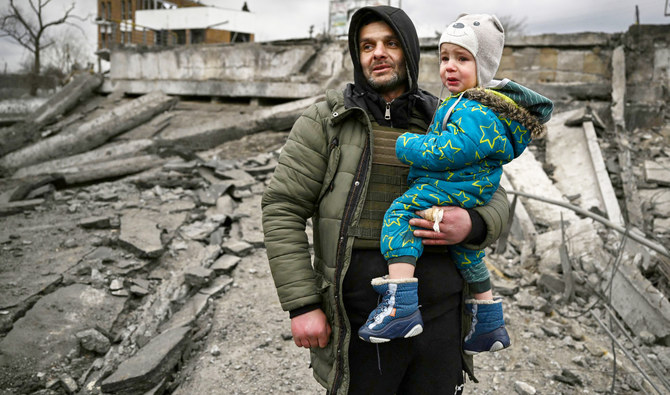
- Hundreds of thousands trapped inside Mariupol without food and water under relentless bombardment
- Russian general who fought in Syria and Chechnya and had taken part in the seizure of Crimea killed
Using frozen Russian assets for Ukraine must align with law, Japan says

TOKYO: Japanese Finance Minister Shunichi Suzuki said on Friday it is important that discussions will be aligned with international law when asked about a US proposal for using the interest derived from frozen Russian assets to aid Ukraine.
“Japan plans to join the discussions at the upcoming Group of Seven meeting from this basic standpoint,” Suzuki said.
Senegalese prime minister criticizes French military bases on territory

- “I reiterate here the desire of Senegal to have its own control, which is incompatible with the lasting presence of foreign military bases in Senegal," PM Sonko said
- Neighbours Mali, Burkina Faso and Niger have pushed out French troops and turned to Russia for help fighting jihadist insurgencies on their territory
DAKAR: Senegal’s prime minister Ousmane Sonko raised the possibility of closing French military bases in the West African country on Thursday in a wide-ranging speech that also touched on the euro-backed CFA franc currency, oil and gas deals and LGBTQ rights.
Sonko, a firebrand politician who gained power when his hand-picked presidential candidate Bassirou Diomaye Faye won a decisive victory in March, is known for criticizing perceived overreach by France in its former colony.
France has about 350 troops in Senegal.
“More than 60 years after our independence ... we must question the reasons why the French army for example still benefits from several military bases in our country and the impact of this presence on our national sovereignty and our strategic autonomy,” Sonko said at a joint conference with the French left-wing politician Jean-Luc Melenchon in the capital Dakar.
“I reiterate here the desire of Senegal to have its own control, which is incompatible with the lasting presence of foreign military bases in Senegal ... Many countries have promised defense agreements, but this does not justify the fact that a third of the Dakar region is now occupied by foreign garrisons.”
Neighbours Mali, Burkina Faso and Niger have pushed out French troops and turned to Russia for help fighting jihadist insurgencies on their territory.
They have also turned away from West African bloc ECOWAS — which condemned their coups — and formed their own alliance of Sahel states.
But Sonko had friendly words for them on Thursday.
“We will not let go of our brothers in the Sahel and we will do everything necessary to strengthen the ties,” he said.
He also said Senegal, which shares the euro-pegged CFA franc currency with seven countries, would like a flexible currency pegged to at least two currencies to help absorb shocks and support export competitiveness.
During the election campaign, Faye had initially pledged to abandon the CFA franc but later backed off his promise.
Sonko reiterated promises to renegotiate oil and gas contracts in Senegal, where production is due to begin this year.
He also called on Western countries to show “restraint, respect, reciprocity and tolerance” on social matters including LGBTQ rights and gender equality.
He said homosexuality had always existed in Senegal, but the country had “managed” it and would continue to do so according to its socio-cultural realities.
“Senegal and many other African countries cannot accept any truth in legalizing this phenomenon.”
China and Russia reaffirm their close ties as Moscow presses its offensive in Ukraine

- Putin and Xi said they were seeking an end to the war in Ukraine, but they offered no new proposals in their public remarks
- China claims to take a neutral position in the conflict, but continues to supply key components needed by Moscow for weapons production
BEIJING: Russian President Vladimir Putin and Chinese leader Xi Jinping on Thursday reaffirmed their “no-limits” partnership that has deepened as both countries face rising tensions with the West, and they criticized US military alliances in Asia and the Pacific region.
At their summit in Beijing, Putin thanked Xi for China’s proposals for ending the war in Ukraine, which have been rejected by Ukraine and its Western supporters as largely following the Kremlin’s line.
Putin’s two-day state visit to one of his strongest allies and trading partners comes as Russian forces are pressing an offensive in northeastern Ukraine’s Kharkiv region in the most significant border incursion since the full-scale invasion began on Feb. 24, 2022.
China claims to take a neutral position in the conflict, but it has backed the Kremlin’s contentions that Russia was provoked into attacking Ukraine by the West, and it continues to supply key components needed by Moscow for weapons production.
China, which hasn’t criticized the invasion, proposed a broadly worded peace plan in 2023, calling for a ceasefire and for direct talks between Moscow and Kyiv. The plan was rejected by both Ukraine and the West for failing to call for Russia to leave occupied parts of Ukraine.
China also gave a rhetorical nod to Russia’s narrative about Nazism in Ukraine, with a joint statement Thursday that said Moscow and Beijing should defend the post-World War II order and “severely condemn the glorification of or even attempts to revive Nazism and militarism.”
Putin has cited the “denazification” of Ukraine as a main goal of the military action, falsely describing the government of Ukrainian President Volodymyr Zelensky, who is Jewish and lost relatives in the Holocaust, as neo-Nazis.
The largely symbolic and ceremonial visit stressed partnership between two countries who both face challenges in their relationship with the US and Europe.
“Both sides want to show that despite what is happening globally, despite the pressure that both sides are facing from the US, both sides are not about to turn their backs on each other anytime soon,” said Hoo Tiang Boon, who researches Chinese foreign policy at Singapore’s Nanyang Technological University.
While Putin and Xi said they were seeking an end to the war, they offered no new proposals in their public remarks.
“China hopes for the early return of Europe to peace and stability and will continue to play a constructive role toward this,” Xi said in prepared remarks to media in Beijing’s Great Hall of the People. His words echoed what China said when it offered a broad plan for peace.
Earlier, Putin was welcomed in Tiananmen Square with military pomp. After a day in Beijing, the Russian leader arrived in Harbin, where he was expected to attend a number of events on Friday.
On the eve of his visit, Putin said China’s proposal could “lay the groundwork for a political and diplomatic process that would take into account Russia’s security concerns and contribute to achieving a long-term and sustainable peace.”
Zelensky has said any negotiations must include a restoration of Ukraine’s territorial integrity, the withdrawal of Russian troops, the release of all prisoners, a tribunal for those responsible for the aggression and security guarantees for Ukraine.
After Russia’s latest offensive in Ukraine last week, the war is in a critical stage as Ukraine’s depleted military waits for new supplies of anti-aircraft missiles and artillery shells from the United States after months of delay.
The joint statement from China and Russia also criticized US foreign policy at length, hitting out at US-formed alliances, which the statement called having a “Cold War mentality.”
China and Russia also accused the US of deploying land-based intermediate range missile systems in the Asia-Pacific under the pretext of joint exercises with allies. They said that the US actions in Asia were “changing the balance of power” and “endangering the security of all countries in the region.”
The joint statement demonstrated China’s support to Russia.
China is “falling over themselves to give Russia face and respect without saying anything specific, and without committing themselves to anything,” said Susan Thornton, a former diplomat and a senior fellow at the Paul Tsai China Center at Yale Law School.
The meeting was yet another affirmation of the friendly “no-limits” relationship China and Russia signed in 2022, just before Moscow invaded Ukraine.
Since then, Russia has become increasingly dependent economically on China as Western sanctions cut its access to much of the international trading system. China’s increased trade with Russia, totaling $240 billion last year, has helped the country mitigate some of the worst blowback from sanctions.
Moscow has diverted the bulk of its energy exports to China and relied on Chinese companies for importing high-tech components for Russian military industries to circumvent Western sanctions.
“I and President Putin agree we should actively look for convergence points of the interests of both countries, to develop each’s advantages, and deepen integration of interests, realizing each others’ achievements,” Xi said.
US State Department deputy spokesperson Vedant Patel said that China can’t “have its cake and eat it too.
“You cannot want to have deepened relations with Europe … while simultaneously continuing to fuel the biggest threat to European security in a long time,” Patel said.
Xi congratulated Putin on starting his fifth term in office and celebrated the 75th anniversary of diplomatic relations between the former Soviet Union and the People’s Republic of China, which was established following a civil war in 1949. Putin has eliminated all major political opponents and faced no real challenge in the March election.
“In a famous song of that time, 75 years ago — it is still performed today — there is a phrase that has become a catchphrase: ‘Russians and Chinese are brothers forever,’” Putin said.
Russia-China military ties have strengthened during the war. They have held a series of joint war games in recent years.
China remains a major market for Russian military, while also massively expanding its domestic defensive industries, including building aircraft carriers and nuclear submarines.
Putin has previously said that Russia has been sharing highly sensitive military technologies with China that helped significantly bolster its defense capability.
Ethiopia protests US ambassador’s speech after he calls for release of political prisoners

- Ethiopia's federal forces are engaging in fighting with several rebel groups in its regions as well as ethnic-related insurgencies, which have led to deaths and the displacement of people
NAIROBI, Kenya: Ethiopia lodged a complaint Thursday over statements by the US ambassador after he said the release of political prisoners could help the country engage in a productive dialogue and that detaining critics won’t resolve the country’s issues.
The Foreign Affairs Ministry said in a statement that Ambassador Ervin Massinga’s speech on policy and human rights contained “allegations” and “unsolicited advice,” and that it would work with the Embassy to correct the “errors and inconsistencies” in his statement.
“The statement is ill advised and contains uniformed assertions. It is contrary to the historic and friendly relations between Ethiopia and the United States,” the ministry wrote.
Massinga had said in his speech that detaining critics would not resolve Ethiopia’s outstanding issues and that “the political dialogue the Ethiopians need could be helped by releasing key political figures.”
He urged the government and rebel groups to agree to dialogue and that “the country has far more to gain through peace than on the battlefield.”
Federal forces in Ethiopia are engaging in fighting with several rebel groups in its regions as well as ethnic-related insurgencies, which have led to deaths and the displacement of people. Human rights groups have accused federal soldiers of rights abuses in regions like Amhara, where rebel groups are based.
A prominent opposition figure was gunned down last month after his release from prison, and a state-appointed rights group has called for an investigation into his death.
US bars imports from 26 Chinese textile firms over suspected Uyghur forced labor

- US officials believe Chinese authorities have established labor camps for Uyghurs and other Muslim minority groups in China’s western Xinjiang region
WASHINGTON: The United States blocked imports from 26 Chinese cotton traders or warehouse facilities on Thursday as part of its effort to eliminate goods made with the forced labor of Uyghur minorities from the US supply chain.
The companies are the latest additions to the Uyghur Forced Labor Prevention Act Entity List that restricts the import of goods tied to what the US government has characterized as an ongoing genocide of minorities in China’s Xinjiang region.
US officials believe Chinese authorities have established labor camps for Uyghurs and other Muslim minority groups in China’s western Xinjiang region. Beijing denies any abuses.
Many of the cotton companies listed are based outside of Xinjiang but source their cotton from the region, the US Department of Homeland Security said in a statement.
The designations help “responsible companies conduct due diligence so that, together, we can keep the products of forced labor out of our country,” Alejandro Mayorkas, Secretary of Homeland Security, said in the statement.
A spokesperson for the Chinese embassy in Washington criticized the move. “The so-called ‘Uyghur Forced Labor Prevention Act’ is just an instrument of a few US politicians to disrupt stability in Xinjiang and contain China’s development,” the spokesperson said.
Washington has restricted imports from 65 entities since the Uyghur Forced Labor Prevention Act Entity List law was passed in 2021, according to the department.
“We enthusiastically endorse DHS’s action today to nearly double the Uyghur Forced Labor Prevention Act’s ‘Entity List’ — while recognizing that the current list remains only a fraction of the businesses complicit in forced labor,” Rep. Chris Smith and Sen. Jeff Merkley, chairs of the bipartisan Congressional-Executive Commission on China, said in a statement.
The lawmakers want DHS to blacklist Chinese companies in the polysilicon, aluminum, PVC and rayon industries and any company in other parts of Asia making goods for the US market with inputs sourced from Xinjiang.



